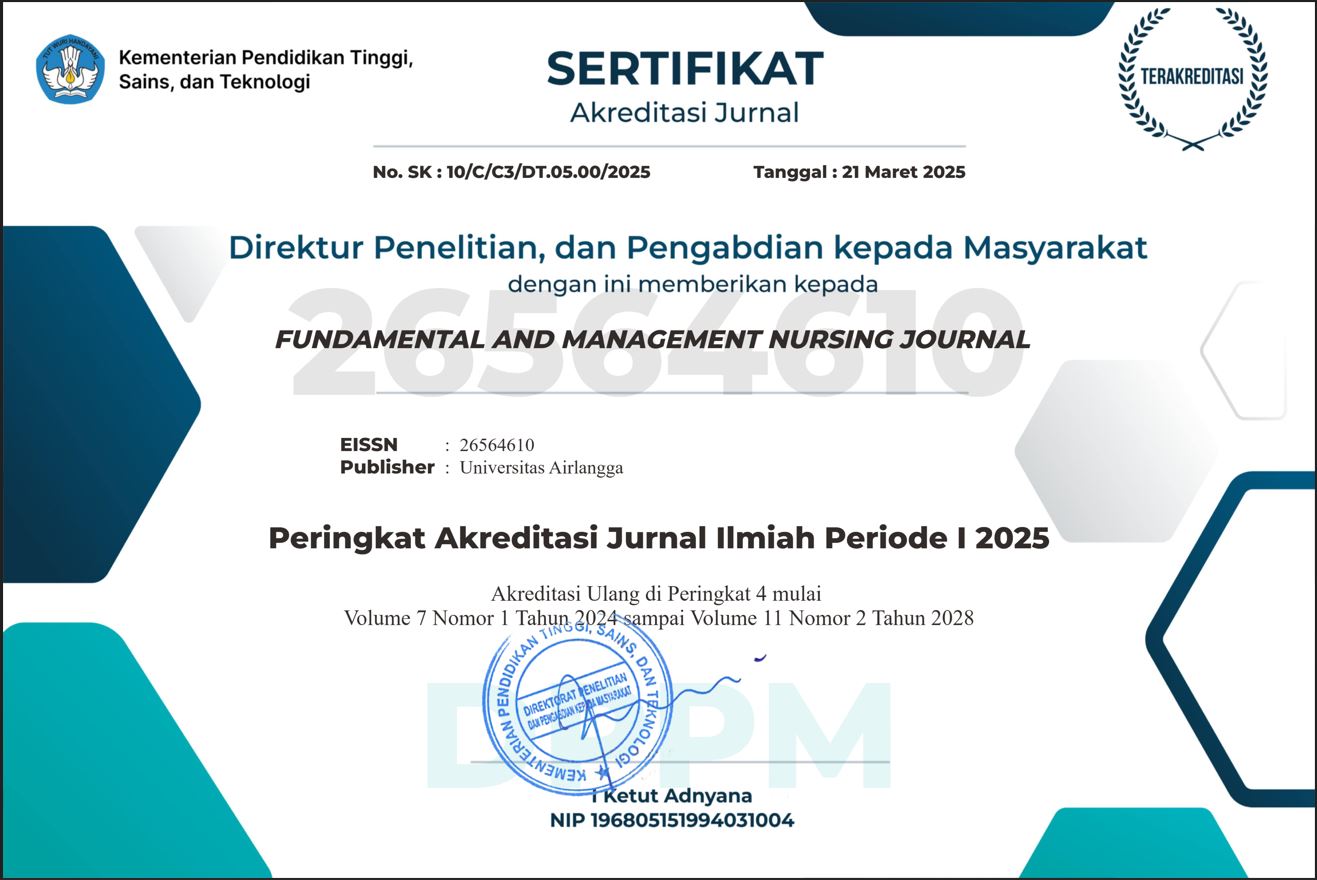The Relationship Between Parenting Patterns and Moral Development of Preschool-Aged Children
Introduction: Parents have their own parenting style in educating, guiding and disciplining children which is relatively consistent from time to time, and this can affect the moral development of children. There are three types of parenting styles used, namely democratic, authoritarian, and permissive. The purpose of this study is to analyze the relationship between parenting style and the moral development of preschool-age children.
Method: The method of this study is correlation analysis with a cross-sectional approach with a population of 35 respondents. The research sample was 32 respondents from parents of preschool children aged 4-6 years with purposive sampling. The research instrument for parental parenting and children's moral development uses a questionnaire. Data analysis using the Chi-Square test.
Results: The results showed that most parents had a democratic parenting style in 19 respondents (59.4%), and the moral development of children mostly showed good moral development in as many as 17 respondents (53.2%). The results of the Chi-Square analysis of parental parenting with children's moral development showed that the p-value of < α was 0.011<0.05 which means that there is a relationship between parental parenting and the moral development of preschool-aged children.
Conclusion: Parenting plays a pivotal role in shaping the moral development of preschool-aged children. The application of an appropriate parenting style is essential for effectively guiding and educating children during this critical stage of development. Given the unique characteristics and needs of early childhood, this study highlights the importance of adopting a democratic parenting style—characterized by warmth, responsiveness, and appropriate boundaries—as a means of fostering positive moral growth. This study underscores the urgency of promoting parenting approaches that support moral understanding, empathy, and pro-social behavior. Future research is encouraged to further explore and develop intervention strategies and educational programs aimed at enhancing children’s moral development through supportive parenting practices.
1. INTRODUCTION
Moral development involves thoughts, feelings, and behaviors based on rules and habits regarding what a person should do when interacting with others(Haryaningrum et al., 2023). For preschool-age children, the family is the first and main educational environment that equips them to face the next life. Parenting is the process of educating, guiding, and disciplining children to reach adulthood by the norms that apply in society. Parenting in the family environment plays an important role in shaping how children interact at school and in the community(Simangunsong & Sihotang, 2022). Researchers make observations regarding parents' parenting patterns towards children because some children don't want to lend their belongings when another friend needs them. Some children clean up toys, but other friends don't help tidy up and choose to leave. Some children behave rudely, like pushing against their peers; some just stay silent, just don't want to hang out with their friends; and some are too active in class.
The World Health Organization (WHO) reports that 5-25% of preschool-age children experience developmental problems(Hidayati, 2022). In the United States and Canada, out of four million births each year, between 40,000 and 120,000 children experience developmental delays. Indonesia itself is among the countries with the third highest prevalence in the Southeast Asian region or South-East Asia Region(Rusmita & Sari, 2022). In addition, Badan Pusat Statistik (2018) shows that the development index of children aged 36-59 months in Indonesia is 88.3%. In East Java Province, the prevalence of developmental data for children aged 36-56 months is 91.5%(Aulia et al., 2022). The number of public and private kindergarten schools in Jombang Regency is 1,376 schools. Moral develompment is a change in a persons behavior, thought, and feelings related to the values of right and wrong. Currently, many children cannot distinguish between good and bad or right and wrong. In Ngoro District, the number of kindergartens is 76 schools(Kemendikbudristek, 2023). The results of a preliminary study by the researcher through observation on several children are that some children behave rudely such as pushing towards their peers, some just stay silent and do not want to get along with their friends, and some are too active in class.
Parenting is a form of interaction between parents and children that includes the fulfillment of physical and psychological needs(Rosyani et al., 2022). According to Hurlock's theory, there are three types of parenting, namely democratic, authoritarian, and permissive. Democratic parenting prioritizes the interests of children with a rational approach and mature thinking. Authoritarian parenting focuses on shaping a child's personality by setting standards that must be obeyed absolutely. Meanwhile, permissive parenting provides loose supervision and allows children to do things with little supervision(Alfiah, 2020). Parenting affects children's development, especially in terms of moral development(Wuryaningsih & Prasetyo, 2022). Moral development is an inseparable development in a child's life. Moral development is related to thoughts, feelings and behaviors that relate to the standard of right and wrong. Moral values that are embedded in children will encourage them to behave politely and politely, respect elders, obey rules, be patient, honest, and respect others(Fitri & Na’imah, 2020). Currently, moral values in children are very lacking, including those related to good manners, assessing what is good and what is not good for them.
Study involving parents and children are critical. It would give global and rapid development emphasis the urgency of moral development among school-age children, particularly in the middle-low countries with a growing population. Therefore, this study aims to determine the relationship between Parenting Patterns and the Moral Development of Preschool Children. To determine moral development and monitor regularly and as early as possible, parents must play a full role in the moral development of preschool children, namely by enquiring, guiding, educating, disciplining, and maintaining children until their maturity following the norms and values of life in the community. Based on the background, the researcher has an interest in carrying out a study entitled "The Relationship between Parenting Patterns and the Moral Development of Preschool”.
2. METHODS
2.1 Design
In this study, a cross-sectional approach is applied with a descriptive method of correlation. Cross-sectional is an approach in which data from several research variables are collected at one time.
2.2 Population, Sample and Sampling
The population of this study is all parents of children aged 4-6 years at Kindergarten Genukwatu Ngoro Jombang, a total of 35 people. In this study, the purposive sampling technique (non-probability) is used as a method of sample selection, where the researcher deliberately selects samples that meet the criteria, objectives, or research problems(Nursalam, 2020)In the process of selecting samples, inclusion and exclusion criteria are used according to the characteristics to be studied. The inclusion criteria consisted of parents of students at Kindergarten Genukwatu Ngoro Jombang who were 4-6 years old and willing to be respondents. The exclusion criteria consisted of parents of students at Kindergarten Genukwatu Ngoro Jombang who were not willing to be respondents and who could not attend. In this sample selection, the researcher obtained a sample of 32 respondents.
2.3 Variable
The independent variable in this study was Parenting Patterns. The dependent variable in this study was the Moral Development of Preschool age Children.
2.4 Instruments
In this study, data was collected through a questionnaire that included parental parenting and children's moral development. The parenting
Copyright (c) 2025 Eliza Zihni Zatihulwani

This work is licensed under a Creative Commons Attribution 4.0 International License.
1. The journal allows the author to hold the copyright of the article without restrictions.
2. The journal allows the author(s) to retain publishing rights without restrictions.
3. The legal formal aspect of journal publication accessibility refers to Creative Commons Attribution (CC BY).
















